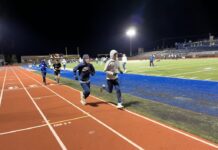“Good coaching may be defined as the development of character, personality and habits of players, plus the teaching of fundamentals and team play.” – Clair Bee, Long Island University Basketball Coach, Co-founder of Kutsher’s Spots Academy (MA), and Basketball and College Basketball Hall of Fame Inductee.
On December 17th and 18th, Jesuit held the annual Southwest Running Summit in the Terry Center. Many coaches and scientists came to speak about distance running to other coaches and athletes from across the country. Several running topics are covered during the presentations and open discussions, including speed training, improving the stiffness of the ankle joint, strengthening different ligaments and tendons in order to help absorb more forces from workouts, and much more.
One of Jesuit’s own coaches, Coach Robinson, helped coordinate the forum this year. He acknowledged the process of getting the Terry Center ready for the summit, saying that “setting up for [it] begins a year in advance. Upon the completion of the previous year’s summit, the process of gearing up for the next year’s summit starts… The Terry Center was a perfect place to host the event this year. With the help of Jesuit staff and parent volunteers, it all came together very well.”
Although the seminar is an annual event at Jesuit, many people do not know about it or what topics are discussed during the two-day period. Coach Robinson emphasized that the speakers try to communicate to the audience their findings so that the audience can take them away from the event. He commented on the presentations, saying “the summit is about distance running: science, biomechanics, training, factors that affect competition… Top scientists and coaches in the field of endurance training present their findings and views to an audience of interested attendees.”
Coach Cahill was another Jesuit coach who attended the Summit, and spoke about important topics for training, presenting alongside Dr. Ken Clark. He explained his experience of discussing his views with the audience, commenting that “it was a great privilege to speak at the Running Summit. To be honest it was a bit overwhelming to be sharing the stage with some of the best researchers and coaches in the world.” He went on to talk about the types of ideas that he and Clark went over during the presentation and some of the other interesting topics covered by other speakers. Coach Cahill continued that he and Clark “gave two presentations focused on planning and implementation of strength training…and speed training for endurance athletes…the summit covered a wide variety of topics from practical running programming for all abilities…to blood doping and sex verification in elite level Olympic athletes.”
Coach Cahill also discussed more in-depth of what the coaches and scientists wanted to inform the audience about. He mentioned how “strength and speed training has many benefits for runners of all levels and abilities. Strength underpins bio-motor control, thus it can help coordination and running economy. Strength is the first line of defense in injury prevention. It strengthens your ligaments and tendons to better absorb the forces put on them during endurance workouts.”
There is not a set date for the next Running Summit, but it is sure to come this year. The Summit in December saw many coaches, runners, and other athletes attend who learned something new or saw a different viewpoint about training and distance running. Coach Cahill described one of the most important parts of running and the training that strengthens athletes, saying that “knowing the population of the athletes the coach is training is paramount to not only being successful in the sport, but to sport enjoyment and lifelong participation. Youth athletes are not mini adults.”






